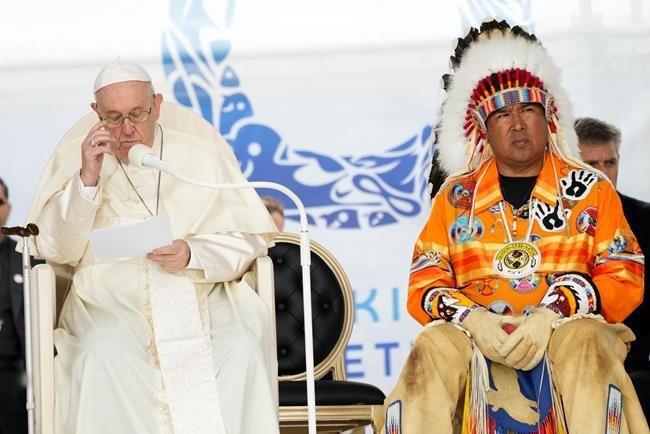OTTAWA — Organizers of the papal visit say the Vatican has "clarified" part of Pope Francis's apology to residential school survivors, noting an error occurred during translation.
The pontiff's words near Edmonton this week raised questions when he said an important part of moving past requesting forgiveness "will be to conduct a serious investigation into the facts of what took place."
Francis, born in Argentina, was speaking Spanish and the apology was being translated into English.
Papal visit organizers say in a statement the Vatican "clarified" the English translation should have meant survivors heard the Pope say what's needed next is a "serious search," not a "serious investigation."
"In listening to what the Holy Father has said, he has communicated his profound desire for the Catholic community to continue taking steps towards the transparent search for truth, and to foster healing and reconciliation," the statement from organizers said.
They say Canadian bishops have also pledged to turn over documents that might help communities identify the remains of Indigenous children believed to be buried in unmarked graves at former school sites.
The desire to see residential school-related records held in the Vatican and other Catholic entities are among the outstanding requests Pope Francis faces as he tours Canada.
Yellowhead Institute executive director Hayden King, who is Anishinaabe from Beausoleil First Nation in Ontario, said his immediate reaction to the pontiff mentioning the need for a search or investigation was how the Vatican is only at the beginning of understanding the harm that has been done.
"We've been living this ... since before Confederation," he said.
"It's not necessarily the case that we're looking for another inquiry."
King said that while the Pope is discussing the need to search for facts, the Catholic Church has "thousands" pages of documents naming clergy who committed abuses against Indigenous children forced to attend residential schools.
"Everyone else is looking for something much more than … 'We're going to go away and figure out what happened, and we'll get back to you.'"
At the same time, King said if an investigation or search leads to the release of more church-held documents, that would help.
The National Centre for Truth and Reconciliation, which collects residential school records, said in a statement the Catholic Church needs to collaborate "to show accountability."
Canada already investigated the system through a Truth and Reconciliation Commission that operated from 2008 to 2015.
It heard from nearly 7,000 survivors and their families about what happened at the institutions, and chronicled how thousands of children suffered abuse, neglect and malnourishment.
This report by The Canadian Press was first published July 28, 2022.
Stephanie Taylor, The Canadian Press



